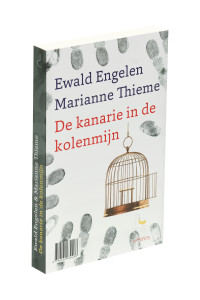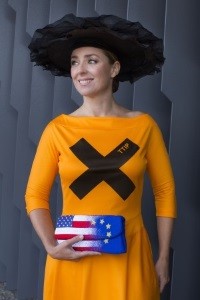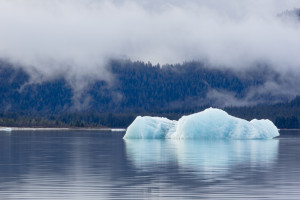Worldlog 18 aprilie 2016
Duminică, 10 aprilie, a avut loc cel de-al 22-lea congres al partidului nostru. Peste 400 de membri au fost prezenți în această zi inspirațională. La fiecare congres mă uimește fapul că oameni ce provin din diferite medii împărtășesc idealurile partidului nostru. Pe lângă elementele obișnuite precum rapoartele și balanțele anuale, profesorul universitar de finanțe Ewald Engelen a susținut o prelegere cu privire la viziunea sa asupra crizei bancare. Acesta a comparat sistemul financiar deficitar cu maniera în care este organizată furnizarea de alimente și multele scandaluri asociate, precum industria cărnii de cal. Acesta a vorbit și despre cum de la un consumator convins de carne, a devenit într-un final vegetarian. Împreună cu Ewald am scris noua carte „Canarul din mina de cărbune”.

„Canarul din mina de cărbune” reflectă viziunile noastre cu privire la economie și ecologie. Cartea va apărea săptămâna aceasta în Țările de Jos. Special pentru persoanele interesate de peste graniță, va apărea și o versiune în limba engleză în format electronic. Aceasta va apărea la începutul lunii mai, deci vă voi ține la curent!
În cadrul worldlog-urilor mele anterioare, am povestit despre referendumul ce a avut loc în Țările de Jos pe 6 aprilie, prin care cetățenii neerlandezi își puteau exprima opinia cu privire la acordul de liber schimb dintre UE și Ucraina. Împreună cu partidul meu am derulat campanii intense împotriva acestui acord și sunt bucuroasă că majoritatea oamenilor au votat împotrivă. Consider că guvernul nostru, ce are o poziție favorabilă, nu poate ignora votul împotrivă.
Săptămâna trecută a avut loc o dezbatere la Camera Deputaților în cadrul căreia am afirmat din nou că un nu din partea poporului neerlandez ar trebui luat ca atare iar acordul nu ar trebui gratificat.
În trecut am insistat la guvern pentru a organiza un referendum cu privire la TTIP. La acea vreme, solicitarea mea a fost refuzată. Rezultatul referendumului cu privire la acordul de liber schimb cu Ucraina arată că majoritatea alegătorilor au o poziție critică cu privire la acordurile de liber schimb. Am făcut din nou o moțiune pentru un referendum cu privire la cât de mult este dorit TTIP. Se va vota asupra acestuia în jurul dății de 25 aprilie.

„Ce mai înseamnă banii dacă se topește calota glaciară?” Acesta era titlul contribuției mele de săptămâna trecută din cadrul dezbaterii cu privire la regiunea arctică. Ne dorim ca guvernul să se impună în vederea protejării Polului Nord. Guvernul neerlandez dorește și protejarea Polului Sud, însă în cazul Polului Nord se pare că profitul economic este situat deasupra naturii fragile și a mediului înconjurător.
Deoarece în pofida faptului că în 2014, Camera Deputaților a admis o moțiune pentru a proteja regiunea arctică împotriva extracției de petrol și gaze, se pare că guvernul se orientează către dezvoltarea oportunităților economice în regiunea Polului Nord. Guvernul își dorește să protejeze interesele companiilor neerlandeze ce pot câștiga de pe urma forajului de petrol și gaze, activități ce pot avea loc acum că Polul Nord se încălzește.

Guvernul dorește să protejeze tot ceea ce este frumos, neatins și semnificativ, cu excepția cazurilor în care vine vorba de bani. Guvernul ar trebui să pună accentul pe protejarea regiunii arctice și a întregii planete împotriva încălzirii și contaminării ulterioare. Nu există un interes mai mare.
Atât pentru acum, pe săptămâna viitoare!
Salutări,
Marianne
On Sunday the 10th of April, we celebrated our Party´s already 22th congress. More than 400 members were present on this inspiring day. Every congress it is remarkable to see people of so many different backgrounds sharing our party’s ideals. In addition to the customary items such as an annual report and annual financial accounts, Professor of Financial Geography Ewald Engelen gave a guest lecture on his views of the banking crisis. He compared the thoroughly rotten financial system to the way our food supply, with its many food scandals including the horse meat fraud, is organised. He also talked about how he had shifted from being a confirmed meat-eater to being a vegetarian. Together, Ewald and I have written our new book De Kanarie in de Kolenmijn (The Canary in the Coal-mine).

In De Kanarie in de Kolenmijn, our visions on economics and ecology meet. As of this week, our book will be sold in the Netherlands. An English version in the form of an e-book will also be published specially for our international readers. This e-book is expected to come out in the beginning of May, so I will keep you informed!
In my last Worldlogs, I have written about the referendum that was held in the Netherlands on 6 April. With this referendum, the Dutch people were able to indicate whether they were in favour of or against the trade agreement between the EU and Ukraine. Together with our party members, I have campaigned strongly against this agreement and I am therefore glad that a majority of the Dutch citizens has also voted against. I think that our government, which is in favour of the treaty, may definitely not ignore the result of this vote. Last week, during a debate in the Lower House, I have indicated once again that a no vote by the Dutch people should literally mean no, and the treaty should therefore not be ratified.
Earlier I have urged our government to hold a referendum on TTIP, but my request was denied. The result of the referendum on the EU/Ukraine treaty shows us that a majority of our voters are critical of free trade agreements. That is why I have once again tabled a motion for a referendum on the desirability of TTIP. It will be put to the vote during the week of 25 April.

“What good will money do you when the icecaps are melting?” That was the title of my contribution to the debate on the Arctic Region last week. We want to see the government fully commit itself to the protection of the North Pole. The Dutch government is fighting for optimum protection of the South Pole, but when it comes to the North Pole, economic gain seems to be put above the fragile wildlife and environment.
After all, despite the fact that the Lower House carried my motion of 2014 on safeguarding the Arctic Region against oil and gas extraction, the government still seems to be focusing on developing economic opportunities in the Arctic. The government is even planning on taking an active role in looking after the interests of Dutch companies that will make money from oil and gas drilling, which has now become possible due to the warming of the North Pole.

The government is willing to protect all that is beautiful, unspoiled and meaningful, expect when there is money in the ground. The government should make the protection of the Arctic Region and the entire planet against further warming and pollution its priority. No other interest can be of more importance.
That’s it for now, until next week!
Kind regards,
Marianne